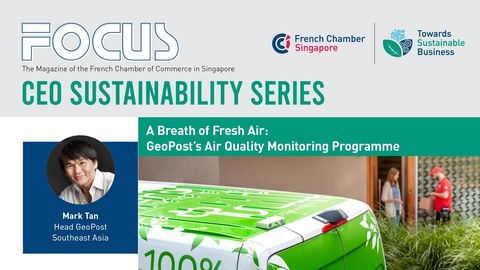Companies news • Analyses & Studies • Portraits • Publications
CEO Sustainability Series | Mark Tan, Head GeoPost Southeast Asia

As part of the Sustainable Business initiative, the French Chamber of Commerce in Singapore presents a leadership interview series where we invite CEOs and key executives to discuss crucial management qualities that drive successful sustainable transformation
Question 1. GeoPost has been quite vocal about its aspiration to become the international reference for sustainable delivery. Can you share more about this mission?
GeoPost is firmly committed to sustainable delivery. We have recently set out a decarbonisation plan with clear science-based targets to achieve net-zero emissions for our operations in Europe by 2040—a full decade ahead of the Paris Agreement. Under this plan, we are, among other things, switching to renewable energy and electrifying our delivery vehicles to reduce carbon emissions and air pollutants in our operations. We have also embarked on an initiative to measure the air quality as a means to mitigate the effects of air pollution on public health. Through these efforts, we aim to lead in net-zeroemissions parcel delivery.
Q2. Can you tell us more about your air quality monitoring programme?
Clean air is a basic human need, but in many cities across the world, this need has been compromised. Fine particulate matters, known as PM2.5, that are prevalent in urban air pollution can penetrate deep into our lungs. Daily exposure to these particles could result in increased respiratory and cardiovascular infections and even death in some cases. WHO has estimated some 4.2 million premature deaths each year were attributable to air pollution, of which up to 15% are avoidable if we could reduce the average PM2.5 concentration. With 30% of urban air pollution coming from urban logistics, the industry has an obvious role to play in making cities more breathable.
In Europe, our delivery network DPDgroup has partnered with Pollutrack to monitor air quality at scale. We fitted laser sensors on top of our delivery vehicles and at pickup points and urban depots to collect real-time PM2.5 data, street by street and at breathing level, as we performed our deliveries. The data collected are made freely accessible online, thereby empowering the public to take preventive measures to safeguard themselves and their families. City planners and administrators can also use the air quality data to support
effective policies or redesign road systems to reduce pollution hotspots and improve air quality in the city.
Q3. Has the programme proven effective?
The programme was successfully implemented in Madrid, London, Lisbon and Rotterdam. In Lisbon, for instance, the authorities are using the data DPD Portugal has collected to design low-emission zones in the heart of the city and improve PM2.5 hotspots for the public in support of the European Green Capital 2020 commitments. The public can easily access the air quality information at bit.ly/AirDiagLisbon by entering the street name.
We are now planning to expand the programme to more European cities. As a way of giving back to the communities, we are offering to run the one-year pilot free so that city authorities can assess the usefulness of the programme before making further commitments. There is more information at www.dpd.com on our air quality monitoring programme.

This interview was conducted with Mark Tan, Head GeoPost Southeast Asia
October 2022 | French Chamber of Commerce in Singapore


